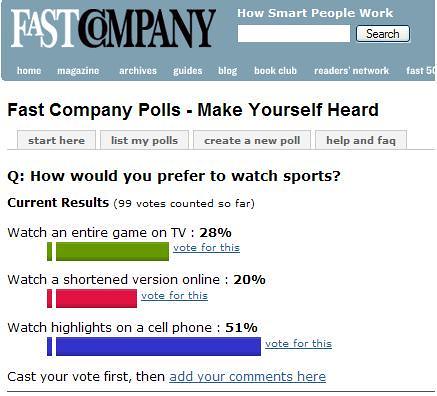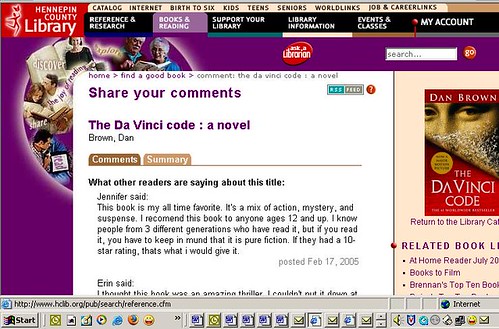There's a post that's been rumbling around in my head for some time -- it's about the socialization of information. Let me give you an example to help set the stage on where these thoughts are coming from ...
Back in January when I first started giving workshops to staff about blogs, wikis and RSS I used a search example to demonstrate how information channels were changing. The term I used? Yup, "Library 2.0"
In that very first workshop, we explored traditional news sources first and here's what we found:
Search of the Library's 50 + electronic database = 0 results from all resources
Search of Google News & Yahoo News = 1 relevant hit.
The Online Catalog --- forget it!!
Then we searched non-traditional resources ...
Search of Technorati = 286 posts mention "Library 2.0"
Wikipedia = 3 pages of principles, thoughts and definitions (see archived Jan 3rd page)
This morning, I duplicated this effort once again to see how things might have changed four months later:
Traditional Research sources:
Search of the Library's 50 + electronic database = 3 relevant news items from Ebsco Masterfile premiere
Search of Google News & Yahoo News = 1 item in Google News, 2 items in Yahoo News
-- Yup a total of only 6 -- I was disappointed here too!!
Non-traditional resource tools:
Search of Technorati for "Library 2.0" = 3,350 posts (for a narrower search, see also tags)
Wikipedia = Still 3 pages, but has been updated considerably with lots more added references
Yahoo Podcast Search = 21 entries!!!
Can you see a trend here? While traditional information channels are still struggling to catch-up, social information channels are exploding and exceeding with speed.
Now while I know that my observation here is not unique -- we all know that information travels faster via the local grapevine than anywhere else -- but what makes the difference is that the traditional "grapevine" is beginning to be replaced by new social networks that are not only changing the way we receive and share information, they are in some ways legitimizing it!
The advent of Web 2.0 publishing technologies (blogs, wikis, podcasts, etc) propelled by collaborative categorization tools (ie tagging, social bookmarking, etc) have enabled ideas and conversations to finally move from the watercooler into the mainstream mass market. I see this shift as significant not only because it means that information and public conversations are no longer controlled by media/publishing authorities, but it also means future significant changes for libraries - who's wealth and access to resources have been built on traditional information models.
Over the course of the last few weeks, I've made note of a several significant changes I see happening and the one that stands out to me the most is the development of Social Searching. All the major players are working on this one and have made announcements in the last few weeks:
Anyway, what’s the point of this whole post -- it's this! Not only is information control and access rapidly changing, but the search tools that will enable mass markets to benefit from personalized shared knowledge pools are well within sight. I believe libraries are in a good position to benefit from this socialization of information… but I also acknowledge that it's going to take radical change for many of our staff to feel comfortable jumping into the SI (Social Information) Zone. Getting on board with Library 2.0 is big step in this direction!
Technorati Tags: Social Search, Library 2.0





